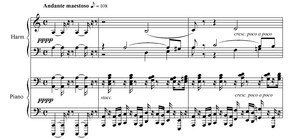| Petite messe solennelle | |
|---|---|
| Mass by Gioachino Rossini | |
 | |
| English | Little solemn mass |
| Form | Missa solemnis |
| Text | |
| Language | Latin |
| Dedication | Louise, Countess of Pillet-Will |
| Performed | 14 March 1864 Paris, France |
| Movements | 14 |
| Vocal |
|
| Instrumental |
|
| Petite messe solennelle | |
|---|---|
| Orchestral version | |
| Performed | 24 February 1869 by Théâtre-Italien, Paris |
| Vocal |
|
| Instrumental | Orchestra |
Gioachino Rossini's Petite messe solennelle (Little solemn Mass) was written in 1863, possibly at the request of Count Alexis Pillet-Will for his wife Louise, to whom it is dedicated. The composer, who had retired from composing operas more than 30 years before, described it as "the last of my péchés de vieillesse" (sins of old age).[a]
The extended work is a missa solemnis (solemn Mass), but Rossini ironically labeled it petite (little). He scored it originally for twelve singers, four of them soloists, two pianos and harmonium. The Mass was first performed on 14 March 1864 at the couple's new home in Paris. Rossini later produced an orchestral version, including an additional movement, a setting of the hymn "O salutaris hostia" as a soprano aria. This version was not performed during his lifetime because he was unable to obtain permission to have female singers in a church. It was finally performed at the Salle Ventadour in Paris by the company of the Théâtre-Italien on 24 February 1869, three months after his death.
While publications began that year, the first critical edition appeared only in 1980, followed by more editions in 1992, the bicentenary of the composer's birth.
Cite error: There are <ref group=lower-alpha> tags or {{efn}} templates on this page, but the references will not show without a {{reflist|group=lower-alpha}} template or {{notelist}} template (see the help page).